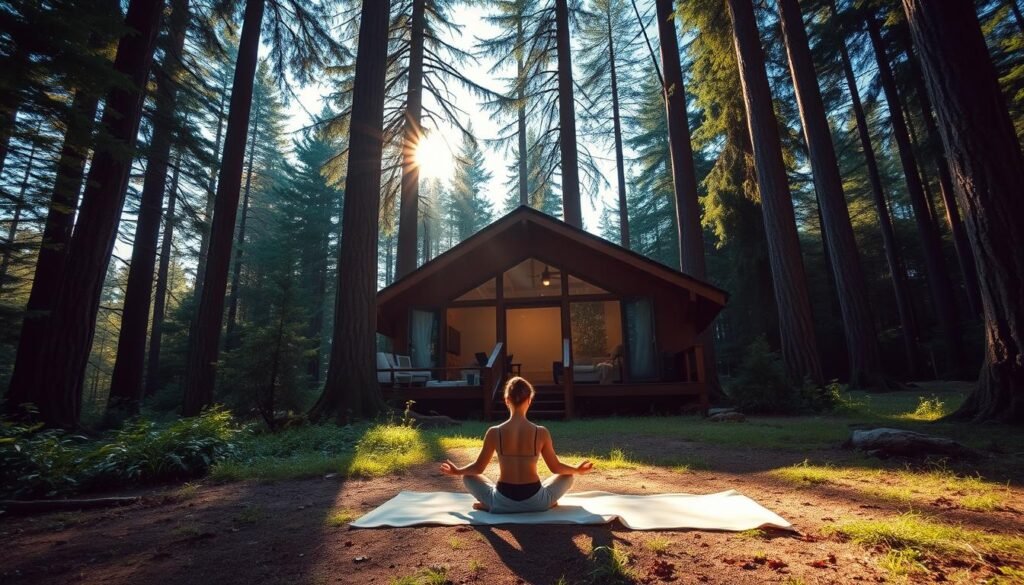Did you know over 1,528 meditation retreats are there for anxiety relief? They have about 47,368 reviews. Today, many people feel stressed and turn to meditation for peace. These places offer a peaceful escape for improving stress management and emotional health.
Retreats last from 3 days to 30 days. They help folks step away from their busy lives. With options like yoga and holistic healing, these retreats aim to boost emotional well-being and provide life-changing experiences.
Key Takeaways
- Over 1,528 retreats available for anxiety relief, reflecting a booming need for mental wellness.
- Participants can choose from various retreat durations and pricing options to fit their schedules and budgets.
- Retreats focus on critical areas such as stress relief, emotional cleansing, and burnout recovery.
- Many retreats incorporate eco-friendly practices, promoting sustainability and community wellbeing.
- Customer feedback is highly valued, ensuring satisfaction through review ratings and testimonials.
The Rising Need for Meditation Retreats
The modern world is facing a big challenge with the anxiety epidemic. People from all walks of life are getting affected. Stress from jobs and personal lives is causing constant worry. As a result, the need for meditation retreats is growing. These retreats teach important techniques for mental peace.
Understanding the Modern Anxiety Epidemic
Research shows that lifestyle and pressure are causing the anxiety epidemic. A large study with over 3,500 people found mindfulness meditation helps. It reduces anxiety, depression, and even physical pain. Meditation builds resilience, helping people handle stress better and stay focused.
The Importance of Mental Clarity and Peace
Meditation retreats offer a deep dive into meditation practices. These techniques improve focus and help manage stress. They bring peace to the mind. Regular meditation reduces stress hormones, calming thoughts and the body. It makes positive energy accessible to all, boosting both emotional health and productivity.
The Benefits of Meditation for Anxiety Relief
Meditation offers many benefits for those struggling with anxiety. Research shows it improves mental health significantly. By practicing mindfulness regularly, people can reduce anxiety and boost their emotional well-being.
Scientific Insights into Meditation Practices
Research proves that meditation benefits both mind and body. The wellness tourism industry, worth over $814.6 billion, includes meditation retreats. These retreats improve focus, thinking, and control of feelings. They are very effective, making up about 50% of the psychological benefits observed.
At these retreats, certain harmful proteins decrease, while helpful ones increase. Benefits last for weeks after the retreat ends. People also improve in concentration and memory quickly. This helps them lead more mindful lives.
How Meditation Enhances Emotional Health
Meditation does more than relax; it changes the brain. It helps users stop negative thoughts. Those attending retreats see big boosts in emotional health. These benefits are even better than traditional vacations or regular mindfulness sessions.
Meditation also improves physical health and reduces anxiety. People of all ages feel better and more focused for a long time. To learn more about these benefits, check out this resource.
What to Expect at a Meditation Retreat
Going on a meditation retreat is enlightening and transformative. It offers various *types of meditation*, aiming at personal growth. You’ll find guided meditations, silent reflections, and body scans. These help you gain deeper clarity and insight.
Types of Meditation Practices
There are many meditation practices to enhance your retreat experience. Among the popular *types of meditation* are:
- Guided Meditation: Led by experienced teachers, these sessions offer support.
- Vipassana Meditation: This method focuses on insight and awareness, encouraging mindfulness.
- Mindfulness Practices: These involve being present without judgment, inviting calmness.
- Yoga and Tai Chi: These practices combine meditation with physical movement.
These practices make a *meditation retreat experience* whole. Attendees get to try different methods and see what fits them best.
Structured Activities and Daily Routines
The daily schedule at a retreat is designed to maximize benefits. Mornings usually begin at 6 a.m. with a long meditation period. Depending on the length, retreats can be three days, a week, or more.
Meals are shared, creating a community feeling. Centers often provide healthy meals or snacks. There might also be massages, chanting, or Pilates, adding to the experience.
Different retreats take place in urban or rural settings. Comfortable clothing is important for lengthy meditations. Facilities vary from simple for short retreats to fully equipped for longer stays. This approach supports deep mindfulness connection and personal growth. Find out more about this journey here.
Meditation Retreats for Anxiety Relief
Finding a good spot for anxiety reduction retreats can greatly improve your mental health. The United States is home to many meditation retreats aimed at helping people with anxiety. These places offer peaceful settings and diverse methods to fight anxiety on many fronts.
Popular Meditation Retreats in the United States
Joshua Tree, California, and Sedona, Arizona, are known for their soothing environments. They offer unique retreats focused on mental health and holistic healing. You can find a range of retreats lasting from 2 to 10 days, fitting various budgets from US$395 to US$13,997. Many also offer eco-friendly choices and seasonal deals, making them available to more people.
Holistic Approaches to Anxiety Management
Meditation retreats for anxiety include activities like:
- Meditation and mindfulness practices
- Yoga sessions
- Art and music therapy
- Shamanic healing and energy work
- Ayurvedic practices
These approaches aim to support those battling anxiety disorders like GAD and SAD. Many attendees report life-changing results. They talk about how these activities help them connect with themselves and manage anxiety better.
Choosing the Right Mindfulness Retreat
Choosing the perfect mindfulness retreat takes thought and care. It’s about matching what you need with what’s available. This ensures a journey that’s both meaningful and tailored to you.
Factors to Consider for Personal Needs
When picking a retreat, it’s important to think about what you need. Consider the following:
- Comfort level: What kind of environment makes you feel supported and refreshed?
- Duration: Are you after a quick weekend or a longer stay?
- Budget: What’s your spending limit for this retreat, including stay and activities?
- Program variety: Would you prefer structured sessions or more free-flowing meditation?
Physical Locations and Natural Surroundings
The location of a mindfulness retreat is key. Being in nature can help you find deeper peace. Think about:
- Scenery: Forest, mountain, or ocean views can all help calm the mind.
- Access to nature: Look for places where you can walk in nature or meditate outside.
- Remote locations: A retreat away from everyday distractions helps focus on growth.
| Retreat Location | Cost | Duration |
|---|---|---|
| Esalen Institute | $540 – $8,000 | Weekends or 5-7 days |
| Kadampa Meditation Center | $10 – $45 | One-day to 3-5 days |
| Spirit Rock Meditation Center | $140 – $22,400 | Drop-in to 2 months |
| Shambhala Mountain Center | $100 – $150 | 2-day to week-long |
| Alaska Stillpoint Lodge | $2,860 per night | 3-6 days |
| Insight Meditation Society | $315+ | 1 week to month-long |
Preparing for Your Retreat Experience
Getting ready for retreats is key to getting the most out of them. Being thoughtful about your journey can make it more rewarding. Before going to a meditation retreat, it’s important to know what you want from it. This helps you stay focused on your personal goals away from daily life.
Establishing Clear Intentions
Having clear intentions guides your retreat. It’s good to think about what you aim to achieve. This might be less stress, more mindfulness, or personal growth. Writing a list of these goals helps keep you on track. Revisit your goals to see how you’re doing. This method leads to a better understanding of yourself.
Digital Detox: Disconnecting for Deeper Connection
A digital detox is key for a great retreat experience. Leaving gadgets behind helps you live in the moment. This means better engagement with your surroundings and deeper self-reflection. It’s best to arrange things like pet care before going. This ensures you’re not worried and can focus on meditation and the retreat’s purpose.

Daily Practices to Cultivate Tranquility
Adding daily mindfulness to your life can really help calm your mind and lessen worry. Even a few minutes of meditation can make a big difference in feeling better. By doing it regularly, you get to enjoy its benefits more deeply. It helps you stay calm and accepting when things get tough.
Integrating Mindfulness into Everyday Life
Incorporating mindfulness into your daily habits links you more to the now. Simple steps can effectively lower stress and improve how you feel emotionally. People often see good results from practices like:
- Mindful eating during meals, focusing on flavor and texture.
- Journaling thoughts and feelings to promote self-reflection.
- Taking mindful walks to connect with nature and surroundings.
Using daily mindfulness practices brings more calm into your life. You can find tips on adding these techniques to your day, helping you find your own way to peace. Check out this useful resource for more information.
Exploring Loving-Kindness and Other Techniques
Loving-kindness meditation helps increase compassion for yourself and others, and it can be life-changing. It’s about recognizing your emotions and becoming more emotionally strong. Doing it often helps you feel peaceful inside and connects you more with people around you. Other helpful methods include:
- Body scan meditation for better awareness and relaxation.
- Deep breathing exercises for quick stress relief.
- Setting daily intentions to stay mindful and directed.
These approaches stress the need for patience and sticking with it. Having a routine that includes loving-kindness meditation can lead to peace and emotional well-being. It equips you to handle life’s challenges more smoothly.
Success Stories from Participants
Participants at meditation retreats share touching stories of how these practices deeply impact mental health. Through meditation, they have beaten many challenges. These stories are truly inspiring examples of meditation success.
Transformative Experiences at Meditation Retreats
At Vipassana meditation courses, the journey starts with early sessions at 4:30 am, lasting for 10 days. This tough routine needs discipline and strength. Even though it’s tough for some, dealing with anxiety or fear of spiders, it leads to personal growth.
The method uses body scans and focuses on feelings to build mental toughness against quick reactions. Despite hard challenges like discomfort and lack of sleep, the gains are usually worth it. People often feel emotional relief and clearer minds after the retreat, showing the powerful change that occurs.
Long-Lasting Impacts on Mental Health
The benefits from these deep retreats stay with people long after they’re home. They often handle life’s problems better, thanks to the mindfulness they embraced. This shows how well meditation works for handling anxiety.
Also, stories show the big role of meditation and tailored therapy in tackling deep issues. People value the personal care that meets their needs, highlighting the strong healing effect of these retreats.

The Role of Nature in Meditation Retreats
Nature enhances the experience at meditation retreats. An environmental connection leads to calmness and clarity. This mix fosters mental and emotional benefits.
Connecting with the Environment for Greater Calm
Outdoor time improves mental health. Even 10 minutes in nature can lower stress. People in nature retreats feel peaceful, letting go of worries.
This setting encourages reflection and clarity, aiding in life choices.
Nature Walks and Their Benefits
Nature walks boost both physical and mental health. They enhance mood and energy in beautiful, calm places. These walks promote mindfulness and connect us to our environment.
Studies show these walks improve focus, lower anxiety, and enhance mood.
| Health Benefits | Description |
|---|---|
| Lowered Blood Pressure | Time in nature helps reduce blood pressure significantly. |
| Reduced Stress Hormones | Forest bathing decreases levels of cortisol and adrenaline. |
| Enhanced Cognitive Function | Nature exposure promotes focus, clarity, and emotional stability. |
| Decreased Symptoms of Anxiety | Engaging with nature is linked to a decrease in anxiety and depression. |
| Improved Mood and Energy | Physical activity in natural settings boosts mood and energy levels. |
Walking meditation and forest bathing offer many benefits. Embracing the outdoors makes meditation retreats more effective. It creates a healing environment and supports growth.
Overcoming Challenges during the Retreat
Attending a meditation retreat can change you. But, you might face challenges that test your commitment to inner peace. It’s crucial to learn how to cope during these times for a rewarding experience. This part will show how to calm a restless mind and stress the need to find stillness.
Coping with a Restless Mind
It’s usual to feel restless when meditating. The retreat includes over 12 hours of meditation daily, from 4 am to 10 pm. Facing distractions is a must. Here are effective coping strategies:
- Focusing on breath: Paying attention to your breath can keep you in the moment, easing anxiety.
- Embracing the discomfort: Accepting restlessness instead of fighting it can lead to major breakthroughs.
- Practicing mindfulness: Being aware of your thoughts and feelings can change how you see them.
Finding Stillness and Acceptance
Finding quiet during meditation matters for going deeper in your practice. After starting with Anapanasati, moving to Vipassana meditation helps. This switch aids in building resilience and empathy. Digging into your thoughts, like checking unconscious biases, opens the door to self-acceptance and healing. Then, using what you’ve learned daily keeps the stillness alive after the retreat.

Every hard moment is a chance to grow. The lessons learned and ongoing support let people tackle their issues well.
For more tips on handling anxiety, check out this resource.
Conclusion
Meditation retreats are a great chance for those looking to ease anxiety and find a deeper self-connection. Through Vipassana or silent retreats in calm places, they help clear the mind and balance emotions. Many say they feel less anxious and stressed, leading to big personal growth during theirjourney towards peace.
At these retreats, the focus is on being mindful and caring for oneself. They let people step away from the constant online buzz. Without phones or computers, attendees really listen to their own thoughts and feelings. Activities like quiet walks and group talks help everyone find inner calm and look inward.
Thinking about finding your own peace, joining a meditation retreat can truly help. It’s not just about managing anxiety but about improving overall health through understanding oneself and connecting with others. Starting this journey leads to discovering new insights and building better relationships with oneself and those around.